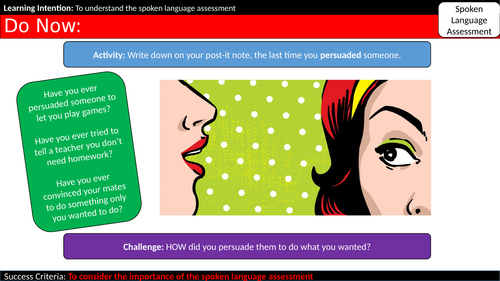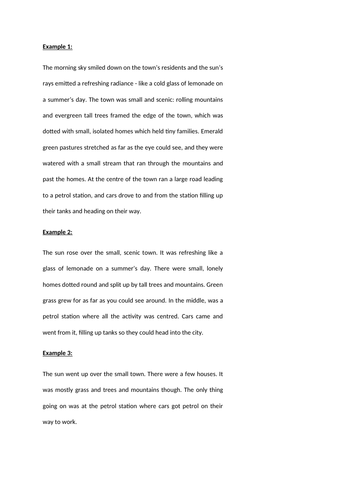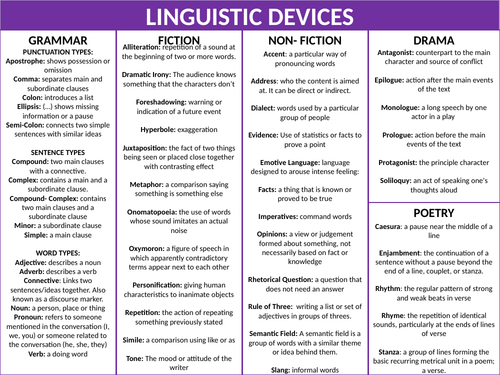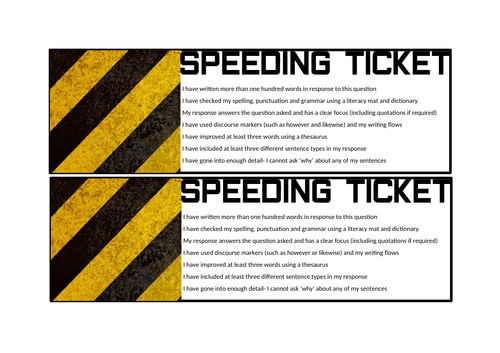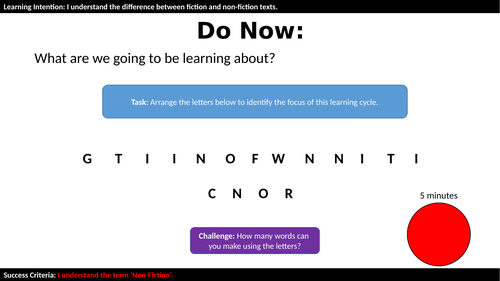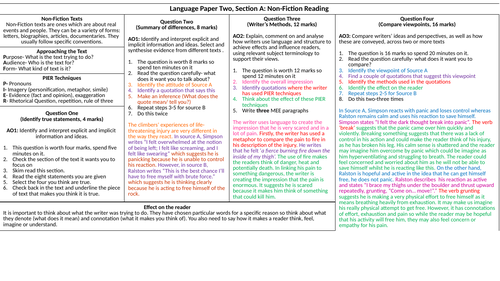
12Uploads
18k+Views
12k+Downloads
All resources

AQA English Language and Literature Structure Strips
Four A4 sheets for each AQA English exam paper. Each sheet has a structure strip to support students with their writing including sentence starters.

Unit of Work: Speaking and Listening
A complete unit of work for speaking and listening Y10 and Y11. Eleven lessons which include writing and presentation skills to prepare students for their speaking and listening presentations.
I know there are some issues with some of the links but here are all the links you may need:
Lesson One:
https://www.youtube.com/watch?v=SqnMQ0RhdaA
https://www.youtube.com/watch?v=v5vMV3Ke6kQ
https://www.youtube.com/watch?v=v5vMV3Ke6kQ
Lesson Two and Eight:
https://www.ted.com/talks/matt_cutts_try_something_new_for_30_days?language=en
Lesson Nine:
https://www.youtube.com/watch?v=S5c1susCPAE

English Careers Display
This display aims to connect all learners to the value of the English GCSE. I have identified core skills (reading, writing, communication, teamwork, organisation and analysis) developed through studying English and linked them to a wide variety of careers. I have purposefully selected a wide range to appeal to all kinds of learners. I have linked professional footballer to the GCSE through teamwork, makeup artistry through communication and construction through reading. Each slide explains the role, salaries, qualifications required and how English helps you achieve the role. The powerpoint includes all required slides and I have made an example to show how I would place the information on the walls (cover image).

Y10: Narrative Writing SOW
The scheme is designed to support students with the planning of narrative writing, with a particular focus on the AQA specification.
There are six stages in the scheme:
An Introduction. This is aiming to motivate and engage pupils in the scheme by developing the group dynamic through shared interests. It also gives pupils to connect their learning to something they enjoy. It’s then very explicitly stated why they need to learn this and connects it to the GCSE exam paper. There is a simplified version of the mark scheme so that students engage with it and are able to use it with their own work.
Planning Our Writing based on Jennifer Webb’s book ‘Teach like a Writer’. Her planning process is based on Jacob Ross’ Short Stories structures. It teaches students how to write premises, build them to plots, develop settings and characters and think about the writing process. The stage is filled with clear information about how to write like a writer.
Putting it all together. Students have a plan and writing model lesson, followed by doing their own. This can be used for diagnosing pupils strengths and targets before you teach the skills lessons so that you can focus on your class’s area of need.
Developing Character with a focus on AO5 content skills. Students are explicitly taught the 5 senses, ambitious vocabulary, and how to create similes, metaphors and personification. It also goes through alliteration for effect. Following each taught skill, students are asked to use this to improve their character description.
Developing Setting with a focus on AO6 technical accuracy skills. Students are taught common sentence errors, different sentence types and different sentence starters for effect. They use these skills to improve their description of setting.
Developing Endings with a focus on AO5 organisation skills. Students look at the structure of paragraphs and different ending styles. They are asked to experiment with their endings to improve their work.
Note: I don’t have copyright permissions for the images or extracts used in the scheme.

Definitions Knowledge Organiser
Two key sheets I have stuck at the top of my desks in my classroom.
The literacy mat includes reading and writing rules to support students with key skills.
The glossary sheet has key terminology on it to support students with using accurate terms during English lessons.

Display of Exam Questions
Covering AQA’s exam specifications, this display informs pupils what is on each exam in both literature and language. They are in the style of top trump cards with relevant pictures, key information and further detail (including example questions).
They are adaptable- particularly relevant for literature as you may not be studying the same texts as my department.

Writing Support
I give one of these to students prone to rushing through work and making silly mistakes.

AQA Eng Lang Paper Two: Y7 Foundation
A scheme of work focussing on AQA Language Paper Two. Designed for year seven, low attaining students, this scheme engages students with the exam questions using injuries in extreme places to introduce them to comparing non-fiction texts.
Note: I do not have copyright for any of the source extracts used in the scheme.

Plenary Cards
A range of plenary activities for pupils to engage in.
I have these laminated and in a bag. I ask students to work in groups of 4 and let them select the activity they do. It takes five minutes at the end of the lesson but seems to work well in consolidating knowledge. Activities include:
Charades
Pictionary
Quizzes
Hot or Not
Ranking
Tweeting
Anagrams
True or False

AQA Eng Lang Paper Two: Y7, Higher
A scheme of work focussing on AQA Language Paper Two. Designed for year seven, higher attaining students, this scheme engages students with the exam questions using injuries in extreme places to introduce them to comparing non-fiction texts.
Note: I do not have copyright for any of the source extracts used in the scheme.

Oracy Support Cards
Great when students are completing presentations to the class to support constructive feedback.
Students should raise the angel or demon dependent on whether or not they have a WWW or an EBI comment. There are sentence starters on the reverse to support the students with structuring their comments.

Encouraging Reading Quotes
A series of quotations about reading from a variety of famous people (including Kim Kardashian) to encourage students and show them the value of engaging with texts. The design is stars coming out of the books and up the wall (the image is an example of the structure). I have this in my classroom above a mini library.


